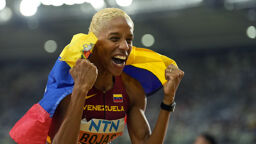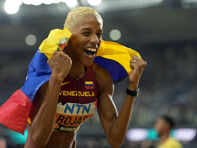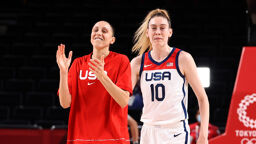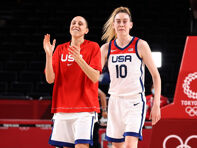Imagine for a second that you're overseas, representing your country, with the objective of your trip being to qualify for the Olympic Games. There is a ton of pressure — pressure of the occasion, the pressure you place on yourself, and the pressure to perform for your teammates, not wanting to let them down.
Now imagine trying to perform at that elite level while suffering from a crippling gender dysphoria, accompanied by the depression and anxiety it regularly brings with it.
You are thousands of kilometers from home, in a country with very little on offer for entertainment, and worst of all you have no one in the group to talk to about your problems. You're in a hyper-masculine environment where any form of weakness is frowned upon.
This was the situation I found myself in late last year in Qatar, as a member of the Australian team attempting to qualify for the men's handball competition at the Rio Olympics. It was during this tournament that I realized I no longer had a choice — I simply had to start living as my true self and transition from male to female. The one thing keeping me going was that I had already acquired the hormones I so desperately needed to start the transition, ready and waiting for me in the glovebox of my car when I got home.
That I was trans was known only to my closest of friends back home. I still needed to navigate coming out, first to my family and then to my wider group of friends. The friends who already knew had provided and continue to provide complete and unconditional support. My friends Kayla and Jess, in particular, will always hold enormous significance as a result.
Surely I thought, it's too much to expect everyone else would accept my transition, let alone support it.
I could not have been more wrong. The support and acceptance I've received from within handball has been nothing but absolute. From players I'd coached, those who had coached me and those who I knew but had never played with, I have not had a single negative response from within my sport.
The team I had been touring with in Qatar, those who had been directly impacted by my completely undisciplined actions on the court during that tour, were some of the most supportive. That my gender issues were at the root of that behavior is something I've never discussed with them, but I'm sure they figured it out. Despite getting myself sent off for kicking drinking bottles on the side of the court, and on two occasions swearing at and insulting my own teammates during matches, they've supported me all the way. This speaks volumes for the culture within Australian handball.
To those who have never been involved, the perception of sport is one of tough men and women, with each player looking to impose themselves as the alpha male or female and rarely tolerant of anything or anyone different. I am here to say that in my experience, nothing could be further from the truth.
I am aware that this won't be the case for everyone, and I'm aware that I have been amazingly blessed in the acceptance I have received. The reality for transgender people is often much darker and can result in homelessness, unemployment, injury and sometimes death. It's for those reasons that trans visibility could not be more important.
My intention is to play for the women's team as soon as I can, and obviously if I am good enough to be selected. I began hormone treatment in November, so it's not long to go now, but I am hopeful of playing a little before that.
The reason is the IOC's guidelines are just that, guidelines, so each athlete can be assessed on an individual basis, and if I am able to get a medical clearance in October rather than November that will be fantastic. The primary objective is always to have a fair competition.
The reason I am hopeful of playing a little earlier is because my testosterone level has consistently been between 0.3 and 0.7 mol since I began treatment, well below the IOC requirement of 10.0 nmol. Having such a low level means I have experienced much more rapid strength, speed losses etc. than someone at the high end. This is why its important people be assessed as individuals, because everyone will react differently to treatment.
I know that playing in the Olympics is a longshot. Handball in Australia receives no government funding and the players on the national team are regularly required to pay their own way to events. This significantly impacts on our ability to play at a high level regularly, and when you combine that with the fact 99% of the other teams are entirely professional, it makes it very tough for us to compete. Australia qualified in the Olympics only once, in 2000, when we got in as host nation.
In aiming to play both within Australia and internationally again, this time as part of the women's team, I am not simply trying to continue a career I started four years ago. It will always be about representing my country as best I can, but now also about representing the transgender community and providing the impetus for true equality within a society that often wants us to be ignored.
Hannah Mouncey, 26, is a handball player who lives in Canberra , Australia. Hannah played 22 games for the Australian men's team including the 2013 World Championships and the Asian qualification tournament for the 2016 Olympic Games. She can be reached via email at [email protected] and on Twitter @hannahmouncey1.







































